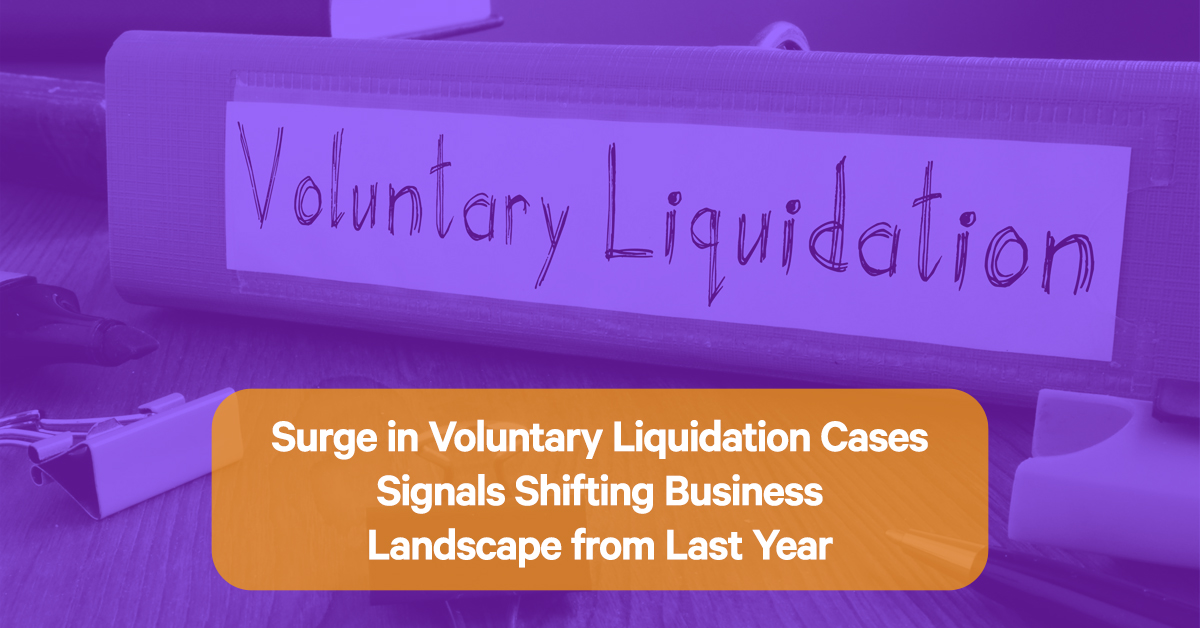A notable trend has emerged that signals a shift in how UK companies are navigating financial challenges. The surge in voluntary liquidation cases over the past year highlights a strategic decision by many businesses to address insolvency proactively. This decision, although seemingly drastic, is often a calculated move to reduce long-term financial damage and pave the way for possible future endeavours or to settle affairs in a way that minimises negative impact on creditors and stakeholders. This blog post delves into the factors contributing to this increase, the implications for the business environment, and how companies can navigate these turbulent waters.
Understanding the Surge in Voluntary Liquidation
Voluntary liquidation occurs when the directors of a company decide to stop operations and dissolve the entity, typically because it can no longer meet its financial obligations. This process involves liquidating company assets to pay off creditors before closing the business. The recent surge in voluntary liquidation cases doesn’t indicate an economic downturn but rather reflects a shifting business landscape where companies are opting for strategic restructuring and realignment.
Several factors contribute to this trend. Firstly, the aftermath of the global pandemic has left many industries grappling with unforeseen challenges, including disrupted supply chains, fluctuating demand, and changing consumer behaviours. Secondly, the rapid pace of technological advancement and digital transformation has forced many businesses to reassess their operational models. Finally, regulatory changes and economic uncertainties, including Brexit-related adjustments, have added another layer of complexity for UK businesses.
These factors highlight the proactive approach businesses are taking towards navigating today’s economic challenges through voluntary liquidation, indicating a broader trend of strategic realignment and adaptation in the face of unprecedented changes.
Implications for the Business Environment
The increase in voluntary liquidation cases has profound implications for the UK business environment. On the one hand, it reflects resilience among businesses choosing to liquidate voluntarily as a strategic step towards mitigating further financial losses and potentially paving the way for new opportunities. On the other hand, it signals a competitive and rapidly changing market landscape where only those who adapt can thrive.
This trend also highlights the importance of financial health and strategic planning for businesses. Companies increasingly recognise the need to be proactive in addressing financial challenges, seeking advice from insolvency experts, and considering voluntary liquidation as a viable option to protect stakeholders’ interests.
Navigating the Shifting Landscape
For businesses facing financial difficulties, the decision to enter into voluntary liquidation is not made lightly. It requires a thorough assessment of the company’s financial situation, strategic goals, and the potential impact on employees, creditors, and the market. Companies considering this route must engage with reputable and experienced insolvency practitioners who can guide them through the process, ensuring they remain compliant with legal obligations and maximise returns for creditors.
What’s more, businesses must adopt a forward-looking approach, leveraging insights from their experience and market trends to inform strategic decisions. This includes exploring new markets, investing in technology and innovation, and developing agile business models that can withstand economic fluctuations.
The Role of Insolvency Practitioners
Insolvency practitioners play a key role in the surge in voluntary liquidation cases. As experts in navigating the complexities of insolvency, they provide invaluable guidance to businesses contemplating voluntary liquidation. From conducting an initial viability assessment to managing the liquidation process, their expertise means the process is handled efficiently, ethically, and in compliance with legal standards.
Also, insolvency practitioners offer strategic advice on restructuring and recovery options, helping businesses identify alternative pathways to liquidation. By leveraging their insights, companies can make informed decisions that align with their long-term objectives and the broader economic landscape.
Embracing New Beginnings
The landscape of voluntary liquidation, although complex, opens the door to new beginnings for entrepreneurs and businesses. This strategic decision, far from marking an end, can often serve as a springboard for future innovation and success. In the wake of liquidation, businesses have the unique opportunity to reassess their goals, strategies, and operations without the weight of past financial obligations.
This period of reflection can lead to the birth of new business models more in tune with current market demands and technological advancements. Plus, the experience of navigating through a voluntary liquidation can provide invaluable lessons in resilience, financial management, and strategic planning. For many entrepreneurs, these lessons become the foundation of their next ventures, enabling them to build more robust and adaptable businesses.
In this way, voluntary liquidation is not just a conclusion but a transition phase, offering a pathway to reinvention and renewed growth. By viewing this process through a lens of opportunity, businesses can emerge stronger, more agile, and better equipped to thrive in the ever-evolving business landscape.
Voluntary Liquidation: A Strategic Path in Changing Times
The surge in voluntary liquidation cases in the UK signals a strategic shift in the business landscape. As companies navigate the complexities of the current economic environment, voluntary liquidation emerges as a proactive solution for those seeking to address financial challenges head-on. This trend highlights the importance of strategic planning, financial management, and the role of insolvency practitioners in guiding businesses through these challenging times.
As the landscape evolves, businesses must remain adaptable, resilient, and forward-thinking. By embracing change and seeking expert advice, companies can navigate the path to recovery and growth, even in the face of adversity.
Get Help From Insolvency Experts
If your business is facing financial challenges and you’re considering voluntary liquidation as a strategic option, our team of experts is here to guide you through the process. With a deep understanding of the shifting business landscape and a commitment to achieving the best outcomes for our clients, we can provide you with the advice and support you need to make informed decisions. Don’t navigate these turbulent waters alone. Call us on 0800 246 1845 or email us at mail@leading.uk.com to discuss how we can help your business adapt and thrive in today’s competitive market.






